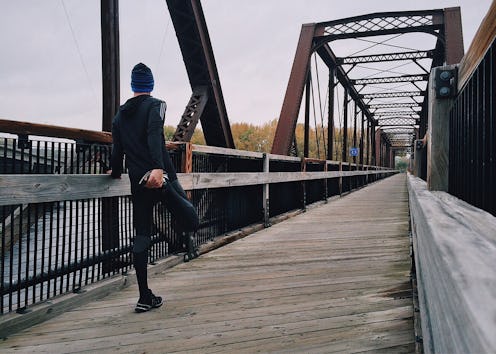Life
9 Ways To Relax The Muscles After A Workout
So, you've just had an amazing, hard workout. You feel great. But your body kind of hurts. It's understandable, of course: Working out taxes the body a lot! To alleviate your sore muscles,, you might go with traditional foam rolling or stretching — but did you know there are actually interesting ways to relax muscles post-workout that can really help loosen those knots, prevent soreness, and boost recovery? Doing a bunch of different techniques can really keep your body in tip-top shape and lower the risk of injury or chronic tightness, long-term.
As a certified health coach, I work with clients on coming up with ways to alleviate tension after a tough workout. Getting in regular exercise is super important, and if the body starts to feel pain or weakness, it will be harder to stay consistent (especially if you're injured, where you need the rest). So, it's best to make stretching and tension-relief post-workout a major priority, as you need to protect your body and cherish it for all its efforts. While regular stretching and massage can always help, there are other really cool ways to reduce inflammation and soreness. Here are a few ways to relax the body after a workout, for instant and more long-term care. Believe me: your muscles will be totally grateful and you'll be able to kick major ass in your next workout.
1. Have Casein Protein
You might already have a post-workout shake, but it's really critical to have one that contains casein protein, as it can deliver a slow release of relief to keep soreness down on a regular basis, explains Steve Hertzler, PhD, RD, and chief scientific officer for Abbott's EAS Sports Nutrition to Bustle. "When casein is in the micellar form, it is slowly digested in the stomach — it is hard for digestive enzymes to get access to it. Studies show that micellar casein releases into the blood slowly, over a period of about six to seven hours. Thus, it is a great protein to eat right before you go to bed, as it can continue to feed your muscles while you sleep," Hertzler says. Plus, sleep is super important for recovery of muscles, so try eating more magnesium in the day, such as in beans or seeds, says Martin Rawls-Meehan, CEO and Co-Founder of sleep technology company, Reverie® to Bustle.
2. Combine Proper Nutrients
"The nutrient combo ofleucine, b-hydroxy-b-methylbutyrate (HMB), andphosphatidylserine (PS) aid in muscle recovery by jumpstarting muscle protein synthesis. They also decrease muscle protein breakdown and cellular damage following exercise, while phosphatidylserine can help reduce your levels of the catabolic hormone cortisol following exercise," says Hertzler. "We designed a protein powder, Myoplex Micellar Casein, to deliver these benefits for athletes who need the extra nighttime nutrition and sleep support," Hertzler adds.
3. Water Immersion
According to Nicholas M. Licameli, PT, DPT from Professional Physical Therapy over email with Bustle, "Water immersion is the use of ice baths or hot tubs, and research shows it can reduce muscle soreness and limit losses in performance." Here's how to do it: "Use cold water immersion (8-15°C/46°F-59°F) for 5-15 minutes or alternate one to four minute bouts of cold and hot water (38°C-42°C/100°F-108°F). Be sure to be submerged to shoulder height," Licameli says.
4. Deep Breathing & Meditation
"Deep breathing and meditation increases parasympathetic nervous system activity (rest, digest, recover) and decreases sympathetic nervous system activity (fight or flight)," says Licameli. "Choose a relaxing environment (an empty room, out in nature, etc.) and position yourself in a comfortable position. Breathe in deeply through your nose and imagine the breath filling up and expanding your abdomen and lower back. Hold for a few seconds and then exhale through your mouth in a controlled manner (don’t just blow the air out). With each exhale, imagine your body melting into the floor. Keep your mind focused on your breathing," Licameli explains.
5. Foam Rolling
"Foam rolling taps into the parasympathetic nervous system (rest, digest, recover) and reduces sympathetic nervous system activity (fight or flight) by inducing a global decrease in muscle tone," says Licameli. "Muscle tone is the continuous passive contraction of a muscle controlled subconsciously by the brain. In other words, it’s a muscle’s resistance to passive stretch," Licameli adds. Give yourself 10-15 minutes post-workout to foam roll.
6. Light Cardio
Over email with Bustle, Reebok brand partner and founder of MobilityWOD, Kelly Starrett says, "One of the easiest ways to recover from an intense workout is to perform 15-20 minutes of low level, easy cardio." This is because your body needs that extra time to slow down but still stay loose. "One of the biggest mistakes people make is to finish training and to turn the engine off. Instead, we should think about continuing to move at a pace where we could easily hold a conversation," Starrett says.
7. Heat Therapy
Ice bath isn't your thing? Try heat therapy. "Heat is a very old and useful modality to relax after hard training. Jump into the hottest sauna/hot tub you can find and stay in there until your brain tells you to run. Then, add one more minute," says Starrett.
8. Fancy Tech
"Use a neuro-muscular electrical stimulating device (NMES) like Marc-Pro or Compex. These proven devices create a non-fatiguing muscle contraction that continues to take the garbage out and bring the groceries in," says Starrett. And, "the advantages of these kinds of units are that you can continue to 'flush' musculatures while sitting or lying down," Starrett adds.
9. Normatec
I've actually tried this, and it's pretty cool. "Use an active compression system like Normatec. These pneumatic compression systems (think big inflatable pants) systematically compress the limbs, mechanically flushing congestion and enhancing blood flow (perfusion)," advises Starrett. Starrett recommends a 20 minute Normatec ride.
Try some of these alternative methods to relax and see if you notice a difference the next day.
